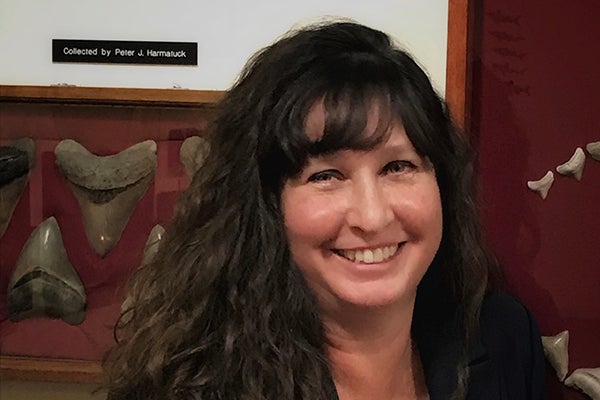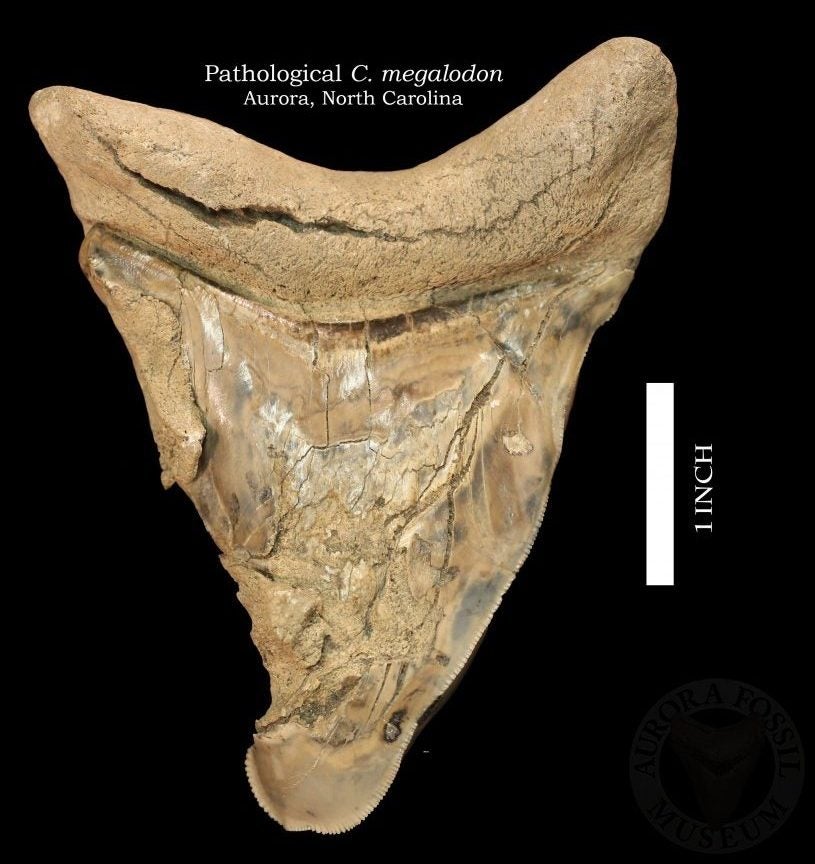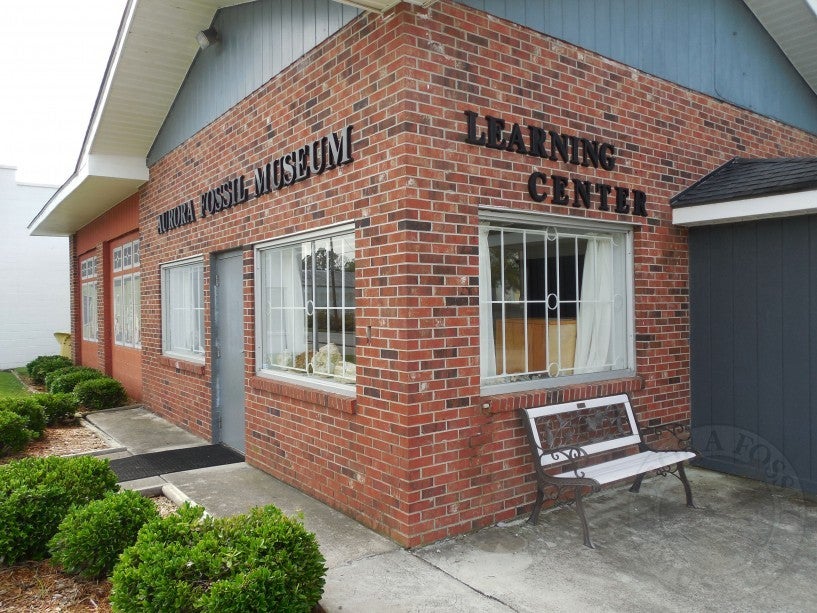ECU alumna is a leader in educating and mentoring students, teachers

Cynthia Crane (Contributed photos)
East Carolina University alumna Cynthia D. Crane is a leader in the eastern North Carolina community and transforms the lives of numerous children and students of all ages every year. As a paleontologist and geologist who specializes in the coastal plain of North Carolina, Crane has dedicated more than 20 years to research, outreach and educational efforts of the state’s fossil record.
Currently, she is executive director of the Aurora Fossil Museum in Aurora, North Carolina, about an hour from ECU near the Pamlico River, where she is responsible for carrying out the decisions of the museum foundation’s board of directors. She also is a part-time faculty member in the Thomas Harriot College of Arts and Science’s Department of Geological Sciences.
“Through my work at the museum, I have been able to contribute to the education of over 100,000 people annually,” Crane said. “It makes me proud to be a catalyst for scientific inquiry by providing a safe, down-to-earth atmosphere where children can explore, interact and engage with science. This type of environment helps develop a child’s confidence in science, which may lead to a future career.”
Crane was a non-traditional student when she transferred to ECU for an undergraduate degree. Raising her two sons as a single parent, she earned a bachelor’s degree in geological sciences, began her graduate studies, worked as a graduate assistant in the department and was the first ECU student to present research at the Society of Vertebrate Paleontology annual meeting in Pittsburgh, Pennsylvania, before earning her master’s degree in geological sciences in 2011.
“I brought a lot of experience and knowledge with me to ECU, and the Department of Geological Sciences helped me to take my experiences and knowledge, combine them with my education and structure me into who I am today,” Crane said. “I have a deep appreciation for the department and am very proud when I can boast about my education. Consisting of highly talented and accomplished professors and staff representing a diverse population, the department leadership offered a nurturing and productive learning environment.”

C. megalogon is a lamnid shark and is related to both modern-day makos and great whites.

Aurora Fossil Museum Learning Center
Dr. Steve Culver, professor and chair of the department who advised Crane during her master’s degree program, said, “Cindy was imaginative and hard working. She had strong opinions that she could back up with knowledge and logical argument. Cindy challenged me. She knew more than I did about the fossils she was studying.”
Today, Culver works alongside Crane as a member of the board of directors of the Aurora Fossil Museum.
Crane serves as a mentor to ECU geological sciences students. Many of the students volunteer at the museum or have toured the museum as part of a field trip offered through one of Culver’s undergraduate courses.
“Visits to the museum allow students to search for and collect their own fossil specimens at a location close to Greenville,” said Culver, who has been taking students to the museum for two decades. “Many areas of the practice of geology involve hands-on activities. We expose the students to a broad range of these kinds of experiences. This engages the students in the subject matter while preparing them for graduate school and careers across the breadth of the geological sciences.”

Geological sciences senior Sidney Green has toured the museum twice and said it was part of the reason she changed her major to geology.
“I always love taking field trips in geology so that I can receive hands-on experience,” said Sidney Green, a geological sciences major who has toured the museum twice. “This field trip gave us a great introduction to some of the fossils we would learn about in class and further on in our geology careers. It was something I really enjoyed doing, and it was part of the reason I switched to be a geology major.”
According to Crane, students have volunteered at the museum in a variety of areas but mostly for the Aurora Fossil Festival, an annual event that attracts about 10,000 participants. Students assist and lead activities to introduce and educate youth on geology and natural sciences.
“Students seem to have a positive experience helping the museum, and it also helps them develop interaction skills as they work with a variety of people in a dynamic setting,” Crane said.
In addition to her mentorship, Crane works to transform the lives of students in Science, Technology, Engineering and Mathematics (STEM) disciplines in other ways. In 2017, she developed a Fossil Kit for Teachers program, which provides a hands-on learning experience coupled with a virtual tour of the museum, for classrooms across the United States. More than 42,000 students were served in 2019-20 alone.
“Each tour is tailored for each classroom, supports the teacher’s curricula, and aligns with state and federal standards,” she said.
Crane said they have fine-tuned the program over the years, and with the 2019 hiring of Andrew Dietsche, the museum’s program developer and another ECU geological sciences alumnus (’15), she added, “Our virtual tours have skyrocketed. Andrew is resilient and can easily take on and tackle any task that comes his way.”
Another community project that Crane is involved in is the continuation of a three-year grant from the Burroughs Wellcome Fund Student STEM Enrichment Program for the IMAGINE-NC (Integrating Mathematics and Geology In Eastern North Carolina) project. The collaborative venture among the museum, ECU, Beaufort County Schools and Nutrien introduces local and regional area middle and elementary school-aged children to STEM concepts through engaging, hands-on, inquiry-based activities.

The museum welcomes school groups for fun and educational experiences, including hands-on digs in the Pit of the Pungo.
“The IMAGINE-NC project has become a model for small organizations on how to implement similar programs in rural, underserved areas,” Crane said.
Under Crane’s leadership, the museum recently was awarded the Trip Advisor Travelers’ Choice Award for 2020.
“Everyone involved with the museum was thrilled to hear this news,” Crane said. “It is a great honor to receive this award, as it reflects the public’s perception of our staff, board, volunteers, interns and work.”
The museum, which closed to the public on March 16 due to the coronavirus pandemic, began a limited reopening on Oct. 3. During the closure, staff members were able to switch focus to online and social media platforms to continue their educational and fund-raising goals. They also completed needed repairs and updates to the museum.
The coronavirus also changed how Crane will teach a geological sciences course at ECU this spring, though it has not tempered her enthusiasm.
“Spring 2021 will be the first time that I will teach ‘Earth and Life through Time.’ Due to the COVID-19 pandemic, my course will be taught completely online, which for me is very exciting as I’ll be able to use the Aurora Fossil Museum as my virtual classroom,” she said.
“It’s such an honor to be given this opportunity to teach a course of a subject that I am passionate about at my alma mater,” Crane said. “It is not only a dream come true for me, it’s also a full circle feeling, as ‘Earth and Life through Time’ was the first course I took as an undergraduate at ECU.”